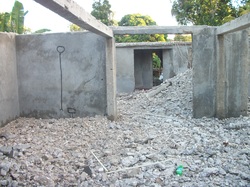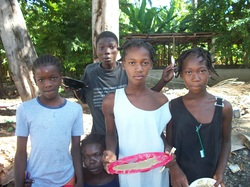Lafana Institute Of Hope Serving the Children of Fauché, Haiti
October, 2010: The Earthquake and Aftermath

The quake destroyed or damaged the main buildings of Lafana, which served as classrooms and sleeping quarters. The majority of the children were displaced to Dini, a 1.5 hour drive away, where they lived for months without access to humanitarian aid, proper shelter, or sanitation services.
In July 2010, International Action visited the orphanage, distributed deworming pills and a modest amount of relief supplies. Soon after, they began providing coordination support to seek food and material aid and support from other groups for the children of Lafana.
In September 2010, UNICEF provided ten large transitional tents to the orphanage, allowing the caretakers to once again house all of the children displaced to Dini and surrounding areas at the original Lafana site. Terre des Hommes has also begun registering the children, many of whom are without any formal documentation like birth certificates or identification cards or had theirs lost in the earthquake.
As Lafana’s well ruptured in the earthquake and dried up, International Action is funding the drilling of a new well and installation of a treadle pump in partnership with UNICEF and Allied Recovery International. This will benefit not only Lafana, but the surrounding community as well (currently, water is gathered off-site from an unprotected spring open to contamination).
In September, the Genesis Network coordinated the donation of 120 family-sized mosquito nets—enough to cover 700 children—from Sumitomo Chemical USA. The nets are now en route and will provide lasting malaria protection for the children. A smaller donation of nets was also made by Vestergaard-Frandsen.
In July 2010, International Action visited the orphanage, distributed deworming pills and a modest amount of relief supplies. Soon after, they began providing coordination support to seek food and material aid and support from other groups for the children of Lafana.
In September 2010, UNICEF provided ten large transitional tents to the orphanage, allowing the caretakers to once again house all of the children displaced to Dini and surrounding areas at the original Lafana site. Terre des Hommes has also begun registering the children, many of whom are without any formal documentation like birth certificates or identification cards or had theirs lost in the earthquake.
As Lafana’s well ruptured in the earthquake and dried up, International Action is funding the drilling of a new well and installation of a treadle pump in partnership with UNICEF and Allied Recovery International. This will benefit not only Lafana, but the surrounding community as well (currently, water is gathered off-site from an unprotected spring open to contamination).
In September, the Genesis Network coordinated the donation of 120 family-sized mosquito nets—enough to cover 700 children—from Sumitomo Chemical USA. The nets are now en route and will provide lasting malaria protection for the children. A smaller donation of nets was also made by Vestergaard-Frandsen.
Ongoing Needs

Lafana continues to seek assistance from groups willing to help. Critical needs in order of urgency include:
Sanitation and Hygiene – Construction of a 12-20 stall toilet block with urinal area, including hand-washing, showering, and laundry facilities; and hygiene trainings, materials, and supplies (soap, shampoo, detergent, etc.) are much needed. At present, there is only one stall used by the children, and open defecation is a persistent health hazard. No hand-washing facilities are currently present. Combined with the soon to be drilled well, additional sanitation infrastructure and trainings will improve hygiene habits, curb open defecation, and reduce the transmission of preventable diseases, like diarrhea and respiratory infections.
School Supplies and Support – Teacher and student materials in the Kreyol and French language for 13 teachers and 300 students would help fulfill the children’s thirst for knowledge and improve their future prospects. Blackboards, chalk, books, notebooks, pens, pencils, crayons, book bags, as well as additional teacher trainings are most welcome. Repeated requests for such supplies have been lodged with relevant education groups, but so far, no response. Long-term teaching volunteers and teacher trainers are also sought.
Food and Nutrition Assistance – Ongoing food and nutrition support, including agricultural and animal husbandry trainings, community gardening, and the planting of food forests for greater self-sufficiency, is highly desired. Breadfruit, yam, and cassava are harvested seasonally, and plantains are available year-round. Rice, beans, oil, and dried fish arrive from the US one or two times per month.
Three meals are provided per day, but at times food shortages have reduced the frequency of meals to once a day. Recently, several children have fallen ill and were hospitalized due to malnutrition. Lafana caretakers would like to localize their food sources, teach the children how to grow vegetables and fruit, raise fish and livestock, and be in greater control of their health and nutrition.
Permanent Shelter and Rubble Removal – Assistance to remove rubble from the quake-destroyed main building will help clear prime land for reconstruction. Construction materials, supplies, and training to build sound, earthquake-proof sleeping quarters and classrooms are essential for returning normalcy to the children’s lives. The majority of them have spent months sleeping in non-weatherproof ramshackle huts.
Recent storms have flooded the tents, and some of Lafana's buildings, in addition to damaging the outdoor kitchen as well. The transitional tents Lafana is using are unlined on the bottom with no tarp footprint, and in heavy rains the roofs pool water. Because of the rains, many of the children were forced to sleep in quake damaged buildings that have not yet been assessed by safety inspectors.
Community Trainings and Medical Team Trips – Lafana welcomes groups willing to conduct trainings for the Fauché community on HIV/AIDS, health and hygiene, and microfinance. Workshops on income generation, job skills development, and community organizing are also in high demand.
Medical clinics to give routine physical, dental, and eye check-ups to Lafana children and to the community at large are much needed, as regular access to health care is a luxury few can afford. In addition, while Lafana has a resident registered nurse and a midwife, medical supplies are limited—first aid items (antibiotics, medicines, bandages, wraps, etc.) and early childcare materials (diapers, wipes, infant formula, etc.) are requested.
Sanitation and Hygiene – Construction of a 12-20 stall toilet block with urinal area, including hand-washing, showering, and laundry facilities; and hygiene trainings, materials, and supplies (soap, shampoo, detergent, etc.) are much needed. At present, there is only one stall used by the children, and open defecation is a persistent health hazard. No hand-washing facilities are currently present. Combined with the soon to be drilled well, additional sanitation infrastructure and trainings will improve hygiene habits, curb open defecation, and reduce the transmission of preventable diseases, like diarrhea and respiratory infections.
School Supplies and Support – Teacher and student materials in the Kreyol and French language for 13 teachers and 300 students would help fulfill the children’s thirst for knowledge and improve their future prospects. Blackboards, chalk, books, notebooks, pens, pencils, crayons, book bags, as well as additional teacher trainings are most welcome. Repeated requests for such supplies have been lodged with relevant education groups, but so far, no response. Long-term teaching volunteers and teacher trainers are also sought.
Food and Nutrition Assistance – Ongoing food and nutrition support, including agricultural and animal husbandry trainings, community gardening, and the planting of food forests for greater self-sufficiency, is highly desired. Breadfruit, yam, and cassava are harvested seasonally, and plantains are available year-round. Rice, beans, oil, and dried fish arrive from the US one or two times per month.
Three meals are provided per day, but at times food shortages have reduced the frequency of meals to once a day. Recently, several children have fallen ill and were hospitalized due to malnutrition. Lafana caretakers would like to localize their food sources, teach the children how to grow vegetables and fruit, raise fish and livestock, and be in greater control of their health and nutrition.
Permanent Shelter and Rubble Removal – Assistance to remove rubble from the quake-destroyed main building will help clear prime land for reconstruction. Construction materials, supplies, and training to build sound, earthquake-proof sleeping quarters and classrooms are essential for returning normalcy to the children’s lives. The majority of them have spent months sleeping in non-weatherproof ramshackle huts.
Recent storms have flooded the tents, and some of Lafana's buildings, in addition to damaging the outdoor kitchen as well. The transitional tents Lafana is using are unlined on the bottom with no tarp footprint, and in heavy rains the roofs pool water. Because of the rains, many of the children were forced to sleep in quake damaged buildings that have not yet been assessed by safety inspectors.
Community Trainings and Medical Team Trips – Lafana welcomes groups willing to conduct trainings for the Fauché community on HIV/AIDS, health and hygiene, and microfinance. Workshops on income generation, job skills development, and community organizing are also in high demand.
Medical clinics to give routine physical, dental, and eye check-ups to Lafana children and to the community at large are much needed, as regular access to health care is a luxury few can afford. In addition, while Lafana has a resident registered nurse and a midwife, medical supplies are limited—first aid items (antibiotics, medicines, bandages, wraps, etc.) and early childcare materials (diapers, wipes, infant formula, etc.) are requested.
